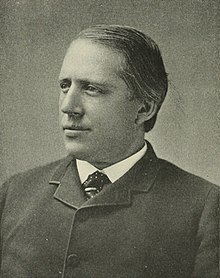Arthur P. Gorman | |
|---|---|
 Gorman c. 1899 | |
| Chairman of the Senate Democratic Caucus | |
| In office March 4, 1903 – June 4, 1906 | |
| Preceded by | James Kimbrough Jones |
| Succeeded by | Joseph Clay Stiles Blackburn |
| In office May 3, 1890 – April 1898 | |
| Preceded by | James B. Beck |
| Succeeded by | David Turpie |
| United States Senator from Maryland | |
| In office March 4, 1903 – June 4, 1906 | |
| Preceded by | George Wellington |
| Succeeded by | William Pinkney Whyte |
| In office March 4, 1881 – March 3, 1899 | |
| Preceded by | William Pinkney Whyte |
| Succeeded by | Louis E. McComas |
| Member of the Maryland Senate from Howard County | |
| In office 1875–1881[1] | |
| Preceded by | John Lee Carroll |
| Succeeded by | Edwin Warfield |
| Speaker of the Maryland House of Delegates | |
| In office 1872–1874 | |
| Preceded by | Ferdinand Claiborne Latrobe |
| Succeeded by | Jesse K. Hines |
| Member of the Maryland House of Delegates from Howard County | |
| In office 1869–1875[1] Serving with William Matthews Merrick (1869–1871), Edward Linthicum (1871–1875) | |
| Preceded by | John R. Clark, I. Thomas Jones |
| Succeeded by | Littleton Maclin, Claudius Stewart |
| Personal details | |
| Born | March 11, 1839 Woodstock, Maryland, U.S. |
| Died | June 4, 1906 (aged 67) Washington, D.C., U.S. |
| Resting place | Oak Hill Cemetery Washington, D.C., U.S. |
| Political party | Democratic |
| Spouse |
Hannah "Hattie" Donagan
(m. 1867) |
| Children | 6, including Arthur Jr. |
| Parent |
|
| Relatives |
|
| Signature | |
Arthur Pue Gorman (March 11, 1839 – June 4, 1906) was an American politician. He was leader of the Gorman-Rasin organization with Isaac Freeman Rasin that controlled the Maryland Democratic Party from the late 1870s until his death in 1906.[3] Gorman served as United States Senator from Maryland from 1881 to 1899 and again from 1903 until his death. He was a prominent leader of the Bourbon Democrat faction of the Democratic Party. Gorman was Chairman of the Democratic National Committee during Grover Cleveland's 1884 presidential campaign and he is widely credited with securing Cleveland's victory.[4] In 1952 Gorman was described in The Baltimore Sun as "easily the most powerful political figure [Maryland] has ever known."[5]
As a young man, Gorman also played a prominent role in the early development of baseball in Washington, D.C. He was a founding member of the original Washington Nationals of the National Association, the first American baseball team, and became one of the nation's star players by 1864. Later in life, he served as a member of the Mills Commission which investigated the origins of the sport.[6]
- ^ a b Arps, Walter E. Jr. (November 2004). Maryland Mortalities 1876–1915 from the (Baltimore) Sun Almanac. Heritage Books. p. 93. ISBN 978-1585492541.
- ^ "Death of Henry Gassaway Davis". The Elkins Inter-Mountain. Associated Press. March 11, 1916. Retrieved March 27, 2021 – via West Virginia Department of Arts, Culture and History.
Mrs. Davis' sister was the mother of the late Senator Arthur Pue Gorman, and the two first cousins were always intimate associates
- ^ Cite error: The named reference
msawas invoked but never defined (see the help page). - ^ "Death Ends Senator Gorman's Career in the Nation's Service". The Washington Post. June 5, 1906. p. 1. ProQuest 144702765.
- ^ Stump, William (October 19, 1952). "Man In The Street: Gorman". The Baltimore Sun. p. 28. ProQuest 541690605.
- ^ Cite error: The named reference
sabrwas invoked but never defined (see the help page).